
Kerry Bair RD on reasons why gymnasts may be underfuled during summer training, and what you can do to help.
Picture this: Summer training has just begun. Your alarm goes off at 7:00 am for practice (which starts at 8:00 am). You try to get up but tell yourself, “Just five more minutes,”… but you accidentally fall asleep and wake up at 7:30 am, and it’s time to go!! So you quickly hop out of bed and throw your leo on. You briefly think about breakfast, but you aren’t hungry, so you decide to skip it, not to mention consider packing a snack – you just don’t have time. Fast forward 90 minutes into your 4-hour practice (on an empty stomach), and you’re dying. You’re just so tired and sluggish. Sound familiar? This scenario happens way too often with gymnasts, and it is setting them up for failure.
Many gymnasts are transitioning to their summer workout schedule this time of year. Summer can be so exciting – a break from school and time to play around in the gym with new skills and work towards those big summer goals. However, this time of year does not always go as planned for so many gymnasts. Even without school, many gymnasts find themselves still exhausted, struggling to get through long workouts. Many struggle with the increasingly challenging strength and endurance workouts and never quite get the new skills and upgrades they’re working towards.
Why are so many gymnasts struggling in the summer?
It’s not uncommon once summer hits that gymnasts tend to struggle with fueling their bodies for performance. With less of a structured schedule without school, a less competitive environment in the gym, and practice times moving to the mornings, it can be easy to under-fuel.
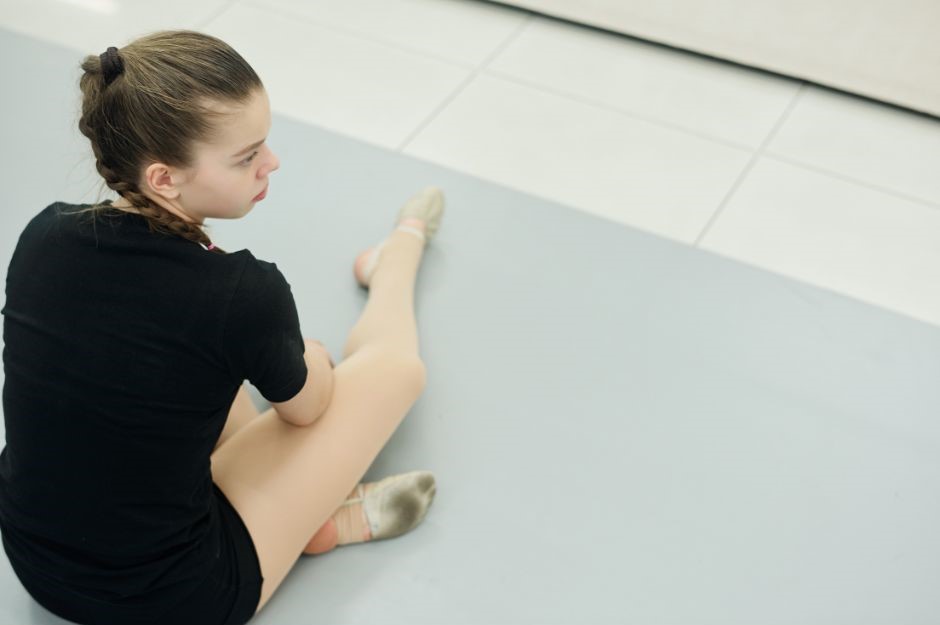
Even without school, many gymnasts find themselves still exhausted, struggling to get through long workouts.
Four Reasons Why Gymnasts Struggle Through Summer Training:
1. They skip or have an insufficient breakfast.
There are so many reasons gymnasts tell me that they skip or only have a small breakfast – they’re just not hungry when they wake up, they don’t have enough time (and want to sleep in until the last second), or they just don’t feel comfortable having food in their stomach at the gym.
No matter the reason, breakfast is vital for gymnasts to eat every day, whether the practice is early in the morning or late at night. Suppose you or your gymnast is skipping or skimping on breakfast. In that case, they are likely under-fueling for their workouts, recovery, and all the other functions the body needs energy for. Breakfast before a morning practice is even more crucial for their performance, energy level, focus, mood, and mental toughness.
2. They don’t bring enough or the right mid workout fuel
Summer workouts for gymnasts are often long! Many gymnasts train for 4 or 5 hours at a time, have all-day practices and camps, or two-a-day workouts. It is ridiculous and unrealistic to expect that even the most solid, well-balanced performance plate-style pre-workout meal will continue to keep you energized, full, and focused for more than a couple of hours. For workouts lasting more than 3 hours, it will be beneficial for performance to bring a high-carb snack. But, so many gymnasts think the snacks or mid-day lunches have to be super “healthy” veggie packed meals (like salad or raw veggies for dipping) and high in protein. But, eating these types of foods in the middle of practice are actually a recipe for low energy and stomach troubles.

No matter the reason, breakfast is vital for gymnasts to eat every day, whether the practice is early in the morning or late at night.
3. They’re dehydrated
Hydration is vital for gymnasts’ performance and recovery. Even marginal fluid and electrolyte losses will cause a decrease in gymnasts’ ability to train. And in the summer heat, sweat rates can increase, meaning gymnasts need to be taking in even more fluid to rehydrate.. It’s crucial for the gymnasts to hydrate before, during and after practice with both water and electrolytes. That being said, many gymnasts, especially those with morning workouts are showing up dehydrated (see item #1), are not drinking enough throughout their workouts (and may only get water breaks every 45-60 minutes between rotations), and either don’t or are not allowed to bring electrolyte drinks or sports drinks.
4. They’ve lost their structured schedule for the remainder of the day (and meals/snacks become erratic)
Often, summer time comes with more relaxed, less structured days and outside of practice time can be filled with pool days, sleep overs, vacations and an overall less busy schedule. Without school, there is a lot more free time that the gymnasts have and with this new found free time, proper fueling can be forgotten about due to the deviation from their normal routine. For example, during the school year, the schools have a scheduled lunch break but in the summer, it’s on the gymnasts to decide when to eat lunch and remember to eat snacks. And, many gymnasts in the summer are left to fend for themselves when it comes to meals and snacks, with busy parents working or taking care of other things, spending time away from the home, or with friends, they may not have the knowledge or skills to fuel their body adequately. However, to keep energy up and to be able to recover from long workouts day after day, it’s important to stay on a consistent fueling schedule through summer training to reach your training goals.
In order to feel and perform your best, try focusing on these 4 simple strategies to fuel your body this summer:
4 Fueling Strategies That Will Help You Fuel and Feel Your Best
1. Make Breakfast a Priority:
Breakfast is the key to turning your body “on” for the day. You’ll need to give your body fuel if you expect it to provide the energy you want through a long summer practice. You wouldn’t expect a car to run on no gas or your phone or laptop to work without being charged…
If you go to practice without breakfast, you’ll likely feel more tired, sluggish, slow, and brain-fogged. Likely, the last fuel you gave your body was dinner or a bedtime snack the day before. And while you sleep, your body is using up all that energy to repair and recover from the previous day and refill your body’s energy stores. Without breakfast, your body will be running on empty at practice, which is not conducive to having enough energy for training and reaching your goals in the gym.
What should breakfast look like?
Your gymnast’s plate should look slightly different before a morning workout to optimize energy levels during practice. It can be challenging to wake up early enough to let food digest and optimize energy levels when practice starts. Ideally, a gymnast should eat a pre-workout meal from one to three hours before a workout and a pre-workout high-carbohydrate snack within 15-45 minutes before practice starts. This tends to work great when practice times are in the afternoon but becomes more challenging when practice moves to the morning. The less time the gymnasts have before practice, the more we will want to focus on easy-to-digest carbohydrates. Carbohydrates will turn into usable energy quicker than any other nutrient, which is why prioritizing carbohydrates right before a workout is ideal.
Most often, if a gymnast has a morning practice, they eat 30-90 minutes before starting warm-up. The more time you have (2-3 hours), the more fiber, fat, and protein will be on your plate. The less time you have (15-90 minutes), the more simple grains and fruits you’ll want to include. The following modified athlete’s plate is a great blueprint starting point, where you can adjust food portions and proportions based on your needs.
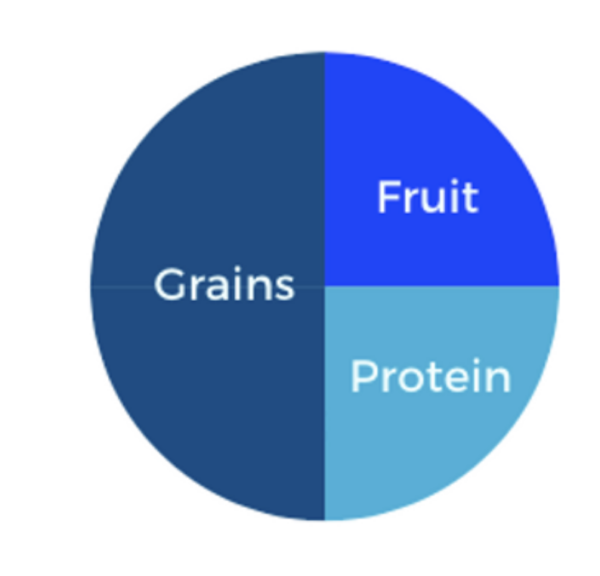
The main concept to understand when it comes to fueling your gymnasts for practice, is that most of their plate should be carbohydrates. Our gymnasts don’t need a plate full of protein and fat right before morning practice, as this will likely cause an upset stomach since it is not as easily digested. Of course, protein, fiber, and fats are all essential nutrients to include in a gymnast’s diet, but not right before a workout.
Some of my favorite examples of a pre-workout breakfast include:
-
A bagel with 2 eggs, cheese, and fruit
-
Oatmeal or overnight oats made with milk, berries, and crushed almonds
-
2 Protein Muffins with an orange and glass of milk
-
Waffles, peanut butter, banana, and milk
-
Greek yogurt, granola, fruit, and chia seeds
So how can we avoid skipping breakfast?
If your gymnasts struggle to eat breakfast, try starting small and working your way up to a solid, well-rounded breakfast. Try to offer any food your gymnast is willing to eat and focus on carbohydrate-rich foods. Carbohydrates are usually the easiest for a gymnast to eat before practice because they are simple and sit well in the stomach. You can try:
-
Dry cereal
-
Granola bar
-
Apple sauce
-
Fruit
-
Smoothie
-
Waffles
-
Toast
-
Bagels
-
Milk
-
Smoothie bowls
-
Even a juice box
What to do if you are constantly running late in the morning?
If your gymnast often runs out of time in the mornings, you can try meal prepping breakfast options the night before so they can grab it and eat in the car. Meal prepping will make it easier to get fuel in before practice on those mornings when you are running late. You can make a smoothie the night before and put it in the fridge or freezer, make overnight oats in a jar, or even something as simple as a peanut butter and jelly sandwich, all of which are easy to take and eat on the go!
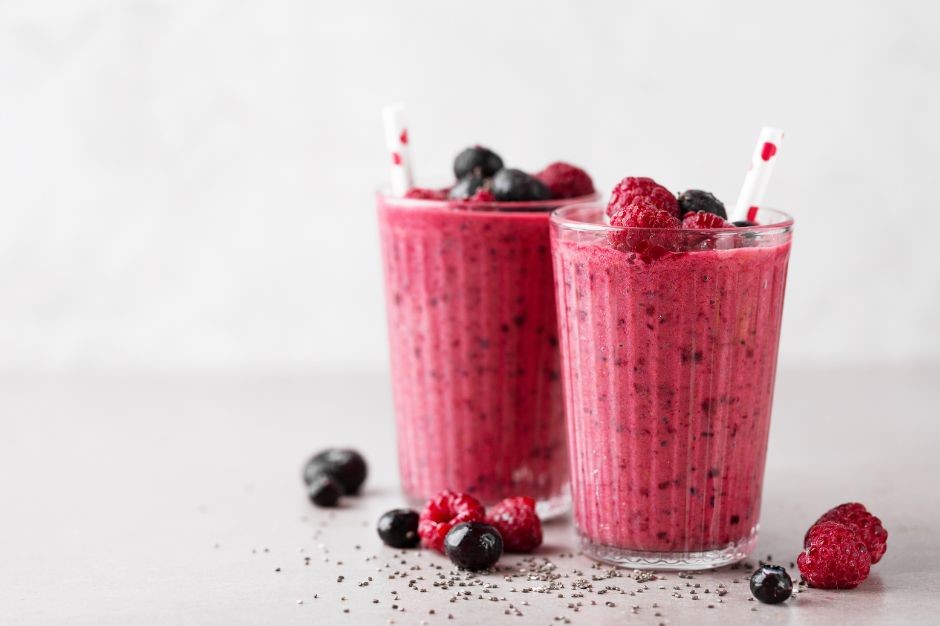
A smoothie is a great breakfast option, that can be prepared the night before, for those early mornings where time is limited.
2. Remember to Refuel During Practice
For practices that are 4 hours long (without an extended break), start with a snack that has around 20-30g of carbohydrate around the 90 minute-to-2-hour mark, and another snack around the 3hr mark.
For practices that are 5 hours long (without an extended break), start with a snack that has around 20-30g of carbohydrate around the 90 minute-to-2-hour mark, and another snack around the 3hr mark, and another at the 4 hour mark.
Some examples of a high-carb mid practice snack include:
-
Single serving pack of pretzels or crackers
-
Applesauce or fruit squeeze pouch
-
1/4C dried fruit or fruit leather/strip
-
1C or medium piece of fresh fruit
-
1-1/2C dry cereal
-
Granola or fruit based bar
-
1 pouch of fruit snacks, dried fruit chews, or caffeine-free energy chews
-
12-16oz of a sports drink (like Gatorade, Powerade, or Skratch)
The idea is to replace some energy lost in your body without upsetting your stomach so you can still perform at your best for the rest of the practice!
What if you have a double practice day??
Whether you’re at the gym all day or you have a 2-a-day practice with a break in the middle, you will need to refuel with more of a complete meal. For a mid-workout lunch, look to build a high-intensity performance plate.
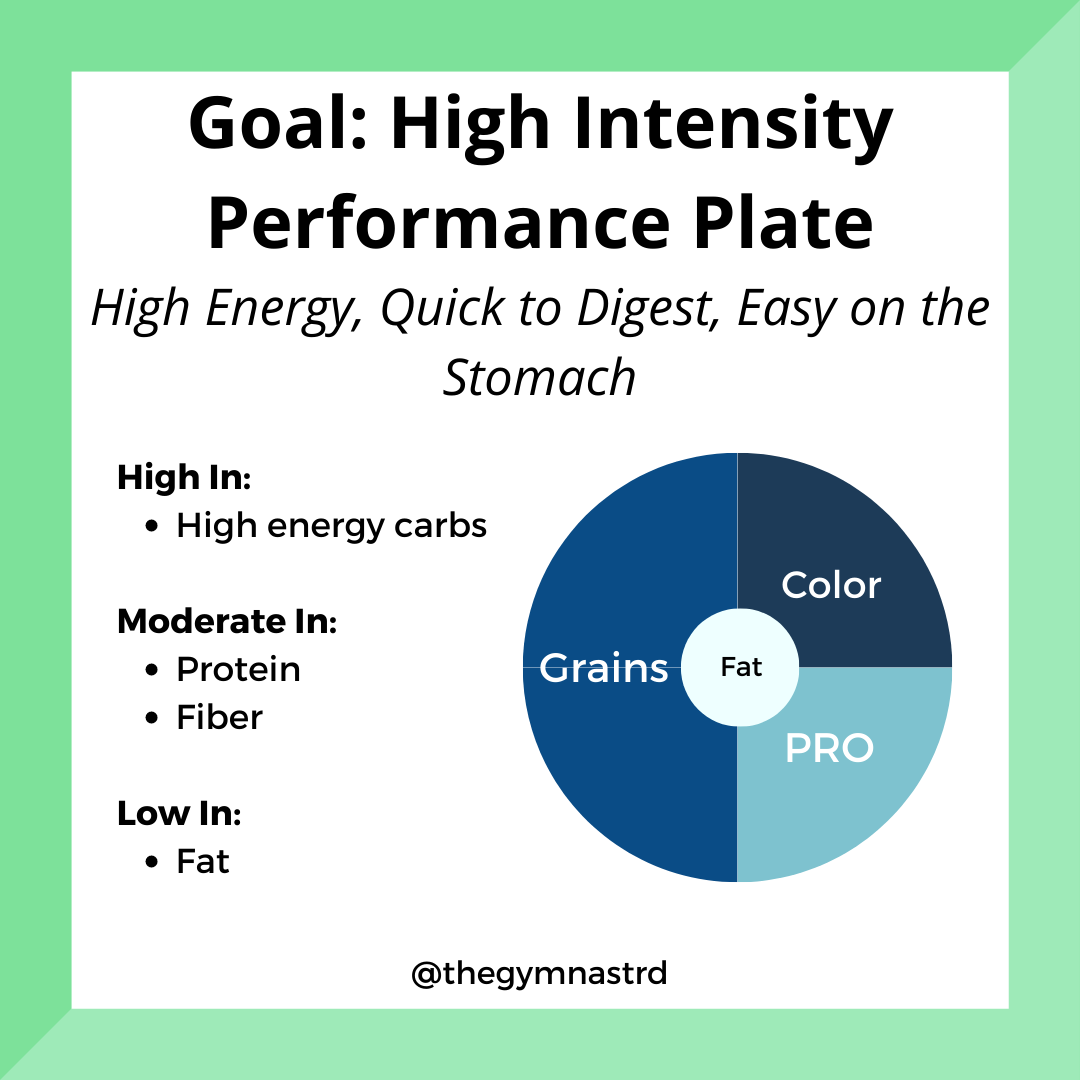
If the break between your workouts is more than 3 hours, prioritize that recovery meal soon after the first practice ends and you should have a pre-workout snack ready to eat as well between 45-15 minutes of starting up again, and consist of a simple carbohydrate like fruit, crackers, rice cakes, etc.
3. Hydrate, Hydrate, Hydrate!
Hydration plays a key role in your body’s recovery from practice. In summer, it’s essential to prioritize hydration because of the warmer weather and the early morning practice schedule. Your body has gone all night without fluids, and you’re likely waking up dehydrated.
How much should you drink? To stay hydrated for training, most gymnasts will need to drink an additional 8-16oz of water in the 2 hours leading up to training, 8-16oz every hour during training, and 16-24 ounces in the hour after training.
Some ways to keep you hydrated for summer training:
-
Drink a big glass of water in the morning
-
Take a sip of your drink every 10-15 minutes
-
Bring your bottle with you to your event, or incorporate a drink into a circuit
-
Eat a salty snack or drink a sports drink after 2 hours of practice
Staying hydrated not only means drinking enough fluid daily, but it also involves maintaining fluid balance throughout the body’s different parts. This process requires energy from carbohydrates (aka sugar) and electrolytes. When we sweat, we lose essential electrolytes that need to be replaced. Those that play a role in hydration are mainly sodium, potassium, and chloride. Electrolyte drinks such as Gatorade, Liquid IV, Nuun, or others can be used before an early morning practice (when the time to rehydrate is limited) or practices lasting more than 2 hours where you may or may not get a snack or meal break.
Pro tip: When picking a sports drink, ensure it contains the electrolytes lost when we sweat. If it does not have electrolytes, rehydration will be difficult.
4. Don’t Forget About What Comes After Practice!
During the summer, the gymnasts are often doing more fun activities with friends and have more free time at home. While they’re having fun with friends outside of the gym after practice, they might forget to fuel their bodies properly. Post workout fuel is important for every gymnasts’ recovery.
What should a gymnast’s fueling schedule look like?
With the gymnasts schedule being less structured it’s ideal to maintain a consistent fueling routine. I recommend eating every 3 hours for optimal performance and recovery. See the fueling schedule below!
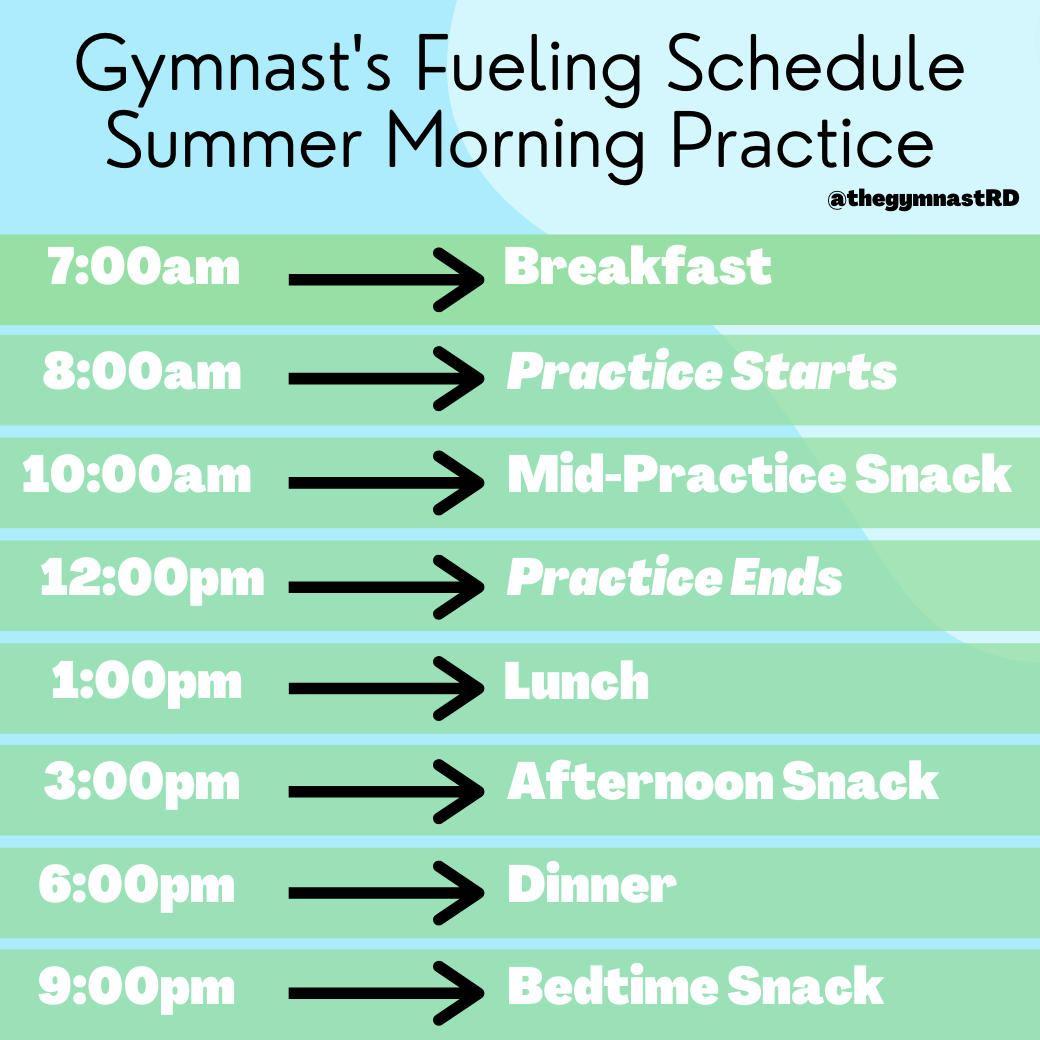
If a gymnast is out with friends or home alone, they may be more inclined to snack rather than to eat a full balanced meal, or may not have the skills to cook or prepare what they’d normally eat. These scenarios are why it’s essential to have handy meals accessible to the gymnasts, especially after a morning workout and throughout the rest of the day so they can recover properly and feel good for practice the following morning.
Here are some of my favorite easy balanced meals to have on hand:
-
Turkey and cheese or PB and banana sandwich with chocolate milk and grapes.
-
Pasta salad with a Fairlife protein drink
-
Tuna fish sandwich with sliced apples
-
Hummus with pita + veggies, string cheese
-
Yogurt, fruit, and granola bowl with chia seeds
Original blog post can be found at: https://www.foodforfuelrd.com/post/4-reasons-why-gymnasts-struggle-through-summer-training-and-4-things-you-can-do-to-help
Kerry Bair, RD, is a Registered Dietitian and owner of Food for Fuel, LLC.